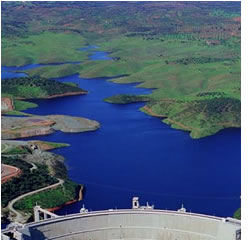 The Case Study aims at assessing the overall performance of a relatively recent hydro-agricultural system and concerns the Monte Novo Irrigation Scheme in Southern Portugal. The Scheme is associated with one of the largest water-related investments ever made in Portugal, the Alqueva system, which deeply changed the agricultural paradigm in that area. Where rainfed crops previously dominated, extensive water supply systems have been developed, allowing the development of large irrigated areas.
The Case Study aims at assessing the overall performance of a relatively recent hydro-agricultural system and concerns the Monte Novo Irrigation Scheme in Southern Portugal. The Scheme is associated with one of the largest water-related investments ever made in Portugal, the Alqueva system, which deeply changed the agricultural paradigm in that area. Where rainfed crops previously dominated, extensive water supply systems have been developed, allowing the development of large irrigated areas.
Overall, the focus is on a development change in agriculture, through the implementation of an irrigation system, which will support more intensive agricultural production. Despite the anticipated significant economic benefits, the development scheme has also incurred increased costs in terms of resources (water, energy and agro-chemicals) and environmental impacts. The latter are expected to result from the change in agricultural practices, including wasteful irrigation water use, and application of fertilizers and pesticides.
According to the relevant Environmental Impact Assessment (EDIA, 2005), the implementation of the scheme, the consequent crop substitution and the impacts of irrigation on the soils will contribute to the (a) disappearance of upland habitats; (b) degradation of soil quality, including the aggravation of the effects of erosion by irrigation, and salinisation, alkalinisation, and degradation of soil structure; (c) surface water quality degradation, due to runoff and inflow of nutrients in water courses; and (d) contamination of the Évora Aquifer, due to the more intensive use of fertilizers and pesticides.
The EcoWater assessment is based on a set of indicators describing the eco-efficiency of the system in terms of irrigation water management and use, water productivity and income from agricultural production, and the minimization of the impacts on the environment (water, soil and air). The Case Study will further assess new technologies for water management, reduction in energy consumption, and eco-friendly agronomic practices, and account for the impacts arising from the change of agricultural paradigm of the area.
Read more...
Documents and other resources
Deliverable 2.1: Value Chain Mapping of the Agricultural Water Systems [PDF, 4.6MB]